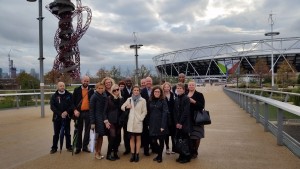 The Conference Board’s Global Social Investing Council, of which I am the program director, held its autumn meeting in London. The meeting’s theme was: “Europe: External and Internal Forces Shaping a New Era.” Our objective was to provide members of the Council the opportunity to benchmark with fellow global companies and learn firsthand some of the critical issues facing Europe and how corporate philanthropy and CSR is responding. Over the three-day meeting, the group heard from European leaders of business, NGOs and governments in an intimate setting with robust discussions.
The Conference Board’s Global Social Investing Council, of which I am the program director, held its autumn meeting in London. The meeting’s theme was: “Europe: External and Internal Forces Shaping a New Era.” Our objective was to provide members of the Council the opportunity to benchmark with fellow global companies and learn firsthand some of the critical issues facing Europe and how corporate philanthropy and CSR is responding. Over the three-day meeting, the group heard from European leaders of business, NGOs and governments in an intimate setting with robust discussions.
As part of Europe 2020, The European Union has set five ambitious objectives on employment, innovation, education, social inclusion and climate/energy, to be reached by 2020. Each Member State has adopted its own national targets in each of these areas. Concrete actions at EU and national levels underpin the strategy. Through the Enterprise 2020 initiative, CSR Europe fosters collaboration and innovative practical action to shape the business contribution to the European Union’s Europe 2020 strategy for smart, sustainable and inclusive growth. Youth unemployment is a huge issue and in some countries it’s up to 50%. Skilling young people for jobs is critical. Their brains are wired differently and we need to be prepared. There are opportunities in Europe for companies for skilling. Barclay’s has developed a Life Skills tool: Skills-Aspiration-Awareness. The move away from electrical, plumbing, agricultural skills is a problem. A majority of the GDP flow is still physical products, yet the basic skills needed for manufacturing have gone away. The Syria conflict has triggered the largest humanitarian crisis since World War II. The European Union is becoming more directive on issues such as non-financial reporting, transparency., environment, philanthropy and governance. There needs to be a move to ensure that reporting actually represents reality in a company. Volkswagen is a good example as they are excellent at reporting, yet they have the emissions scandal. There is also the continuing issue between the UK and the rest of Europe. Europe looks at things more structurally; the UK tends to look at things based on relationships.
The group toured of Queen Elizabeth Olympic Park from an environmental and suitability perspective. Olympic Park is at the heart of a new east London – one where diversity and cultural vibrancy meet economic growth and the city’s newest, cleanest and most sustainable communities. North East London, and the surrounding Hackney Wick neighborhood, was an industrial wasteland that has undergone gentrification. A promise was made that the biggest impact from hosting the Olympics in this part of London would be ‘the regeneration of an entire community for the direct benefit for everyone who lives there’. Westfield Stratford City employs over 10,000 people 2,000 of whom were long-term local unemployed who found work through Newham’s Work Place and Westfield’s permanent retail, hospitality and leisure training academy – The Skills Place. The center has signed up to the London Living Wage ensuring that all Westfield staff as well as contractors are paid the London Living Wage allowance.
Dinner was at Jamie Oliver’s Fifteen. At the restaurant we heard from a restaurant manager plus two of the apprentices. Their mission: “To create one of London’s finest restaurants and, on the other, to use the magic of cooking to give young people who’ve often faced enormous challenges in their lives, the opportunity to unlock their true talent, through great training and mentoring.”
Brixton is a historic neighborhood in the story of diversity and multicultural evolution in London. It was plagued by riots in the 80’s and 90’s. Brixton is in a renaissance, but many parts are still impoverished. Brixton Green is a community benefit society set up by Brixton residents so Brixton people can be at the forefront of the redevelopment of Somerleyton Road. Somerleyton Road sits in one of the most deprived wards in the UK. The aim of local people is for a development that helps connect their town, provides truly affordable homes, jobs, sustainable development and improves quality of life. We spent time meeting the founders and participants of Block Workout, we walked through Brixton Village where many in the group purchased t-shirts made to order from Hustlebucks, a social enterprise. The group enjoyed a wonderful African and Caribbean lunch at Prestige Café and Restaurant. The owner and her son spoke candidly about their struggles and how this business has helped not only their family but the neighborhood’s youth to get out of gangs and off of drugs. Our surprise lunch guest was Tim Kiddell, Private Secretary and Speechwriter to the Prime Minister David Cameron. He talked about the importance of corporate philanthropy and employee volunteering to help places such as Brixton get back on their feet. He also talked about David Cameron’s UK version of the Daily Point of Light Award, a program of Points of Light.
https://www.conference-board.org/councils/councildetail.cfm?councilid=346
http://www.csreurope.org/enterprise-2020-manifesto
http://queenelizabetholympicpark.co.uk/our-story/transforming-east-london
https://www.facebook.com/BrixtonStreetGym/
https://www.pointsoflight.gov.uk/
